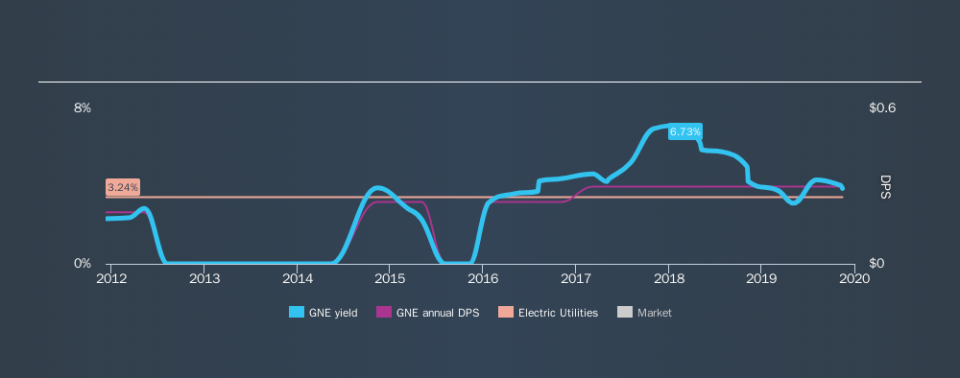What To Know Before Buying Genie Energy Ltd. (NYSE:GNE) For Its Dividend

Dividend paying stocks like Genie Energy Ltd. (NYSE:GNE) tend to be popular with investors, and for good reason - some research suggests a significant amount of all stock market returns come from reinvested dividends. On the other hand, investors have been known to buy a stock because of its yield, and then lose money if the company's dividend doesn't live up to expectations.
With a goodly-sized dividend yield despite a relatively short payment history, investors might be wondering if Genie Energy is a new dividend aristocrat in the making. It sure looks interesting on these metrics - but there's always more to the story . The company also bought back stock equivalent to around 1.5% of market capitalisation this year. Before you buy any stock for its dividend however, you should always remember Warren Buffett's two rules: 1) Don't lose money, and 2) Remember rule #1. We'll run through some checks below to help with this.
Explore this interactive chart for our latest analysis on Genie Energy!
Payout ratios
Dividends are usually paid out of company earnings. If a company is paying more than it earns, then the dividend might become unsustainable - hardly an ideal situation. Comparing dividend payments to a company's net profit after tax is a simple way of reality-checking whether a dividend is sustainable. Genie Energy paid out 53% of its profit as dividends, over the trailing twelve month period. A payout ratio above 50% generally implies a business is reaching maturity, although it is still possible to reinvest in the business or increase the dividend over time.
Another important check we do is to see if the free cash flow generated is sufficient to pay the dividend. The company paid out 65% of its free cash flow, which is not bad per se, but does start to limit the amount of cash Genie Energy has available to meet other needs. It's encouraging to see that the dividend is covered by both profit and cash flow. This generally suggests the dividend is sustainable, as long as earnings don't drop precipitously.
While the above analysis focuses on dividends relative to a company's earnings, we do note Genie Energy's strong net cash position, which will let it pay larger dividends for a time, should it choose.
We update our data on Genie Energy every 24 hours, so you can always get our latest analysis of its financial health, here.
Dividend Volatility
One of the major risks of relying on dividend income, is the potential for a company to struggle financially and cut its dividend. Not only is your income cut, but the value of your investment declines as well - nasty. The first recorded dividend for Genie Energy, in the last decade, was eight years ago. Although it has been paying a dividend for several years now, the dividend has been cut at least once by more than 20%, and we're cautious about the consistency of its dividend across a full economic cycle. During the past eight-year period, the first annual payment was US$0.20 in 2011, compared to US$0.30 last year. Dividends per share have grown at approximately 5.2% per year over this time. The growth in dividends has not been linear, but the CAGR is a decent approximation of the rate of change over this time frame.
It's good to see the dividend growing at a decent rate, but the dividend has been cut at least once in the past. Genie Energy might have put its house in order since then, but we remain cautious.
Dividend Growth Potential
With a relatively unstable dividend, it's even more important to evaluate if earnings per share (EPS) are growing - it's not worth taking the risk on a dividend getting cut, unless you might be rewarded with larger dividends in future. Strong earnings per share (EPS) growth might encourage our interest in the company despite fluctuating dividends, which is why it's great to see Genie Energy has grown its earnings per share at 47% per annum over the past five years. With recent, rapid earnings per share growth and a payout ratio of 53%, this business looks like an interesting prospect if earnings are reinvested effectively.
Conclusion
Dividend investors should always want to know if a) a company's dividends are affordable, b) if there is a track record of consistent payments, and c) if the dividend is capable of growing. First, we think Genie Energy is paying out an acceptable percentage of its cashflow and profit. Next, earnings growth has been good, but unfortunately the dividend has been cut at least once in the past. While we're not hugely bearish on it, overall we think there are potentially better dividend stocks than Genie Energy out there.
Are management backing themselves to deliver performance? Check their shareholdings in Genie Energy in our latest insider ownership analysis.
Looking for more high-yielding dividend ideas? Try our curated list of dividend stocks with a yield above 3%.
We aim to bring you long-term focused research analysis driven by fundamental data. Note that our analysis may not factor in the latest price-sensitive company announcements or qualitative material.
If you spot an error that warrants correction, please contact the editor at editorial-team@simplywallst.com. This article by Simply Wall St is general in nature. It does not constitute a recommendation to buy or sell any stock, and does not take account of your objectives, or your financial situation. Simply Wall St has no position in the stocks mentioned. Thank you for reading.

 Yahoo Finance
Yahoo Finance 
